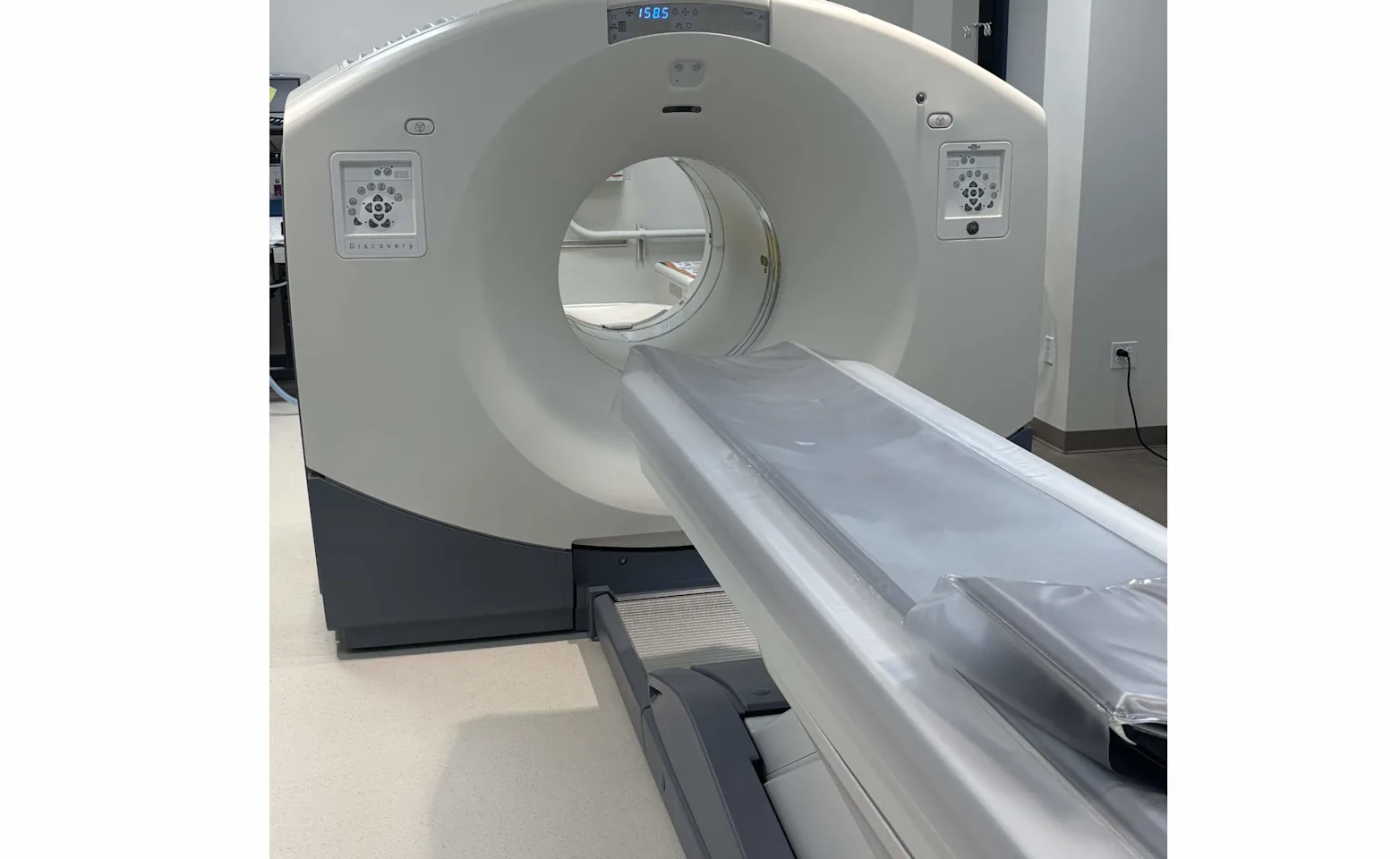Red Bank Veterinary Hospital - Tinton Falls

Radiation Oncology
One option your pet’s oncologist may recommend is radiation therapy. Radiation therapy, which uses high-energy beams of radiation directed at tumors, is used to treat solid cancers in the body. This may include tumors of the skin, nose, brain, mouth, bones and gastrointestinal system.
Our radiation oncology team uses imaging like CT and MRI as well as advanced technology like a linear accelerator, which produces and focuses a beam of radiation precisely where the tumor is located.
Cancers We Treat (But Not Limited To):
Nasal lymphoma
Mast cell tumor
Transitional cell carcinoma
Non-splenic hemangiosarcoma
Anal gland carcinoma
Osteosarcoma
Soft-tissue sarcoma
Oral tumors
Malignant melanoma
Nasal tumors
Brain and spinal cord tumors
There are Two Main Intents Of Radiation Therapy:
Palliative consists of fewer fractions delivered in a daily or weekly fashion. Palliative radiation protocols are utilized to alleviate pain and clinical signs associated with the tumor.
Definitive intent radiation protocols are utilized when there is a potential for long-term control of a tumor.
Radiation Therapy Capabilities:
Varian Trilogy w/ high-definition multi-leaf collimator (MLC) equipped with stereotactic radiation therapy (SRT) capability. SRT involves the delivery of a precisely modulated radiation beam to treat macroscopic tumors in sensitive areas that cannot be surgically removed.
Stereotactic Body Radiation Therapy (SBRT) is used to treat all other regions outside the brain and spinal cord and is typically performed in as few as 3-5 treatments.

PET/CT (Positron Emission Tomography/Computed Tomography) combines two powerful imaging techniques to provide detailed insights into your pet’s health. This technology allows us to detect cancer, inflammation, and other conditions earlier and more accurately than ever before. Red Bank Veterinary Hospital is proud to be one of the very few veterinary hospitals in the United States equipped to perform PET/CT and we do so with one of the most advanced systems available: the GE Discovery 710, a 128-slice PET/CT scanner. This state-of-the-art technology, widely used in human medicine, allows us to detect disease at the molecular level with unmatched precision.
To perform a PET/CT scan, we administer a small amount of a radioactive imaging agent that travels through your pet's body and highlights areas we need to examine more closely. The agent is designed to target specific tissues, helping us see how those areas are functioning at a cellular level.
Once the agent has circulated, we use our advanced PET/CT scanner to capture detailed images. The PET scan shows how the body is working internally – such as detecting abnormal activity – while the CT scan provides a clear picture of your pet’s anatomy. Together, these images give our board-certified specialists powerful insights to help diagnose conditions and guide the best possible treatment plan.
Why It Matters for Your Pet
Pinpoints disease at the cellular level before symptoms appear
Improves accuracy of treatment planning
Minimizes invasive procedures
Enhances monitoring of chronic conditions
If your pet has been diagnosed with cancer, neurological issues, or unexplained symptoms, PET/CT may offer critical answers. Talk to your primary veterinarian to schedule a consultation with our team.
PET/CT FAQ - Referring Veterinarian
When should I refer a patient?
Patients may be appropriate candidates for PET/CT imaging when a comprehensive diagnostic evaluation is needed for cancer detection, staging, or treatment monitoring. It is also valuable in cases involving complex inflammatory conditions, such as fever of unknown origin, where precise localization of disease activity is essential for guiding treatment. Patients will be admitted for imaging through the radiation oncology service – you can always call them with questions at xxxx or discuss case management with one of our other specialty teams.
What information is pertinent to include in the referral?
We kindly request a comprehensive patient history and relevant diagnostic findings, in addition to a summary in addition to a brief summary of the clinical indication for the PET/CT scan.
What are the preparation steps required before the scan?
General anesthesia is required for PET/CT and, as with all other anesthetized procedures, we will ensure that patients are appropriately screened. A physical examination will be performed on all patients along with pre-anesthetic bloodwork (complete blood count and chemistry panel) if it has not been recently performed. Depending on the patient’s medical history, additional diagnostics—such as an echocardiogram for those with a heart murmur—may be recommended on a case-by-case basis.
What is the cost?
The cost for PET/CT imaging includes the scan and interpretation, radioactive isotope, anesthesia, and hospitalization. Final charges may vary depending on the patient’s size and any additional pre-anesthetic diagnostic testing that may be required. Detailed estimates can be provided upon request to assist with case planning.
What are the clinical advantages of a Pet CT Scan?
PET/CT is the most sensitive imaging modality available for detecting hypermetabolic tissue activity. Widely regarded as the gold standard for cancer detection and monitoring in both human and veterinary medicine, it also provides valuable diagnostic insight into localized and multifocal inflammatory conditions, as well as complex musculoskeletal disorders.
PET/CT FAQ - Clients
What is a PET CT scan
A PET Scan uses radioactive versions of normal molecules in the body to detect activity in the tissues. In our case, we are using a specific radioactive sugar molecule (F-18 or FDG) to look for increased metabolic activity that is associated with many types of cancer and other inflammatory processes.
How is this different from a regular CT or MRI?
A PET Scan is overlaid on top of a normal CT scan by advanced computers so the radioactive material's activity in the body (detected on the PET Scan) can be localized to specific tissues and organs. This allows us identify specific locations of potential tumors/cancers, as well as sources of inflammation.
Why might my pet need a PET CT scan?
A PET/CT scan may be recommended as part of the process of diagnosing cancer, finding sources of inflammation (for example, in the case of a patient with an unexplained fever or a patient with a lameness that standard X-rays are unable to diagnose), and in monitoring the response of some cancers to chemotherapy or other cancer treatment.
Is sedation necessary for this?
To ensure optimal image quality, the patient must remain completely still for 1–2 hours during the scan. As movement can significantly compromise the results, general anesthesia is required for the duration of the procedure, similar to protocols used for MRI.
How long does the scan typically take?
The PET/CT scan typically takes approximately two hours to complete. However, the full process—including anesthesia administration, imaging, and post-procedure recovery while the radioactive tracer naturally clears from the body—generally spans 8 to 10 hours. Throughout this time, patients are closely monitored by our experienced medical team and are only discharged once their radiation levels have decreased to a point deemed safe for contact with others. Due to the short-lived nature of the isotope used, the risk of radiation exposure is minimal, and there is no concern for long-term radiation effects on the patient.
What are the preparation steps I should take for my pet?
To ensure optimal scan accuracy, pets should be well rested the day prior to the procedure. Avoiding vigorous activity or high-impact exercise is important, as these can lead to increased metabolic activity in healing tissues, resulting in false-positive "hot spots" on the scan. Additionally, patients must fast after midnight the night before to ensure an empty stomach prior to anesthesia. A thorough medical history is essential to accurately interpret the scan and avoid misidentifying normal post-procedural uptake, such as at recent surgical or injection sites, as abnormal findings.
How to book for a PET/CT?
To schedule a PET/CT consultation, please contact our Oncology Service directly at (732) 747‑3636. Our team will review the patient’s medical history, discuss the appropriateness of PET/CT imaging, and coordinate all necessary pre-anesthetic testing. Following consultation, we will assist with scheduling the scan and provide a detailed estimate upon request.


